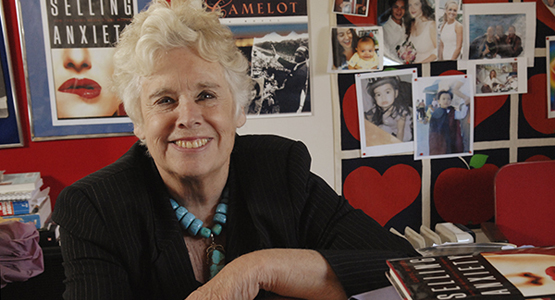“Journalism Was a Magic Carpet”
COM’s Caryl Rivers wins SPJ Lifetime Achievement Award

Writer Caryl Rivers started her career interviewing baseball players and swimmers, a task the self-described “girl jock” was happy to take on. At the time, more than 40 years ago, young female reporters were normally not assigned to cover athletes, or for that matter, any important events.
“I moved from sports to a bigger arena, and I realized that it was a big world out there,” the College of Communication professor remembers. “I had the sense that journalism was a magic carpet that would take me places that most people didn’t get to go.”
Rivers was right. Over the past four decades, her career has taken her from a press conference with J. Edgar Hoover to blogging on The Huffington Post. And it has earned her a fair share of honors, most recently the Society of Professional Journalists Helen Thomas Award for Lifetime Achievement, which she received last month.
Thomas, the journalist for whom the award is named, has been a reporter for more than 60 years. She was the first female member and first female president of the White House Correspondents’ Association and currently writes for Hearst newspapers. She received the first award in 2000; other recipients include Tom Brokaw, in 2004, and Chuck Stone, in 2007.
“I think it’s especially meaningful that the award is named after Helen Thomas because she was one of my idols when I was a young journalist,” says Rivers. “She pioneered covering politics and the presidency. In the beginning she was just assigned to cover the first lady, because women were simply not given the job of covering the president for major organizations, and she became the dean of the White House correspondents.”
Following in Thomas’ footsteps, Rivers is herself a role model for aspiring journalists. She was a Washington correspondent for several newspapers, including the Boston Globe, the Washington Star, and the Baltimore Sun, covering the civil rights movement, the Kennedy presidency, Vietnam, and issues such as gender, race, and class. She is the author of 14 books, including Slick Spins and Fractured Facts: How Cultural Myths Distort the News; Selling Anxiety: How the News Media Scare Women; and Camelot, a novel set in the Kennedy administration. Her screenplay A Matter of Principal won the National Association of Catholic Broadcasters’ Gabriel Award in 1990 as one of the best television dramas of the year. Besides blogging for The Huffington Post, most recently comparing John McCain’s position on Russia to the Hungarian Revolution, she contributes regularly to major newspapers, among them the Boston Globe, the Los Angeles Times, and the Philadelphia Inquirer. Rivers has also appeared as a public affairs panelist on Boston television stations, frequently focusing on media discrimination against women.
The COM professor is quick to acknowledge that the media have improved in their treatment of women, but she believes that the profession still has a glass ceiling. In a March 2008 Boston Globe article, “The Double Standard,” Rivers accuses reporters of asking Barack Obama easy questions while directing the tougher ones to Hillary Clinton.
Rivers recalls one her most memorable experiences — covering a press conference by FBI director J. Edgar Hoover. Hoover regarded the press conference for female journalists as a formality, she says, because women were considered inferior to their male colleagues. When Hoover told the reporters that Martin Luther King, Jr., was one of the most notorious liars in the country, Rivers took down every word. “We were astonished when Hoover let that drop,” she says. “We asked him if it was on the record, and he said yes. The papers quoted me making this claim about Hoover, so I wound up on the front pages all across the country. It caused a firestorm and certainly remains one of my most memorable stories.”
Mindful of the changes journalism has been through over the years, Rivers doubts that most young journalists today will write only for newspapers. Like her, she says, they’ll write for different media, some of which have yet to be invented. The one thing that will remain the same, she says, is what attracted her to journalism in the first place: that magic carpet that takes journalists places most people don’t get to go.
“I’ve seen a lot of things in my career, and there aren’t many jobs like journalism that get you in those kinds of situations,” Rivers says. “I do hope that a few of my students may look at my career and say, yes, that’s possible.”
Amy Laskowski can be reached at amlaskow@bu.edu.

Comments & Discussion
Boston University moderates comments to facilitate an informed, substantive, civil conversation. Abusive, profane, self-promotional, misleading, incoherent or off-topic comments will be rejected. Moderators are staffed during regular business hours (EST) and can only accept comments written in English. Statistics or facts must include a citation or a link to the citation.